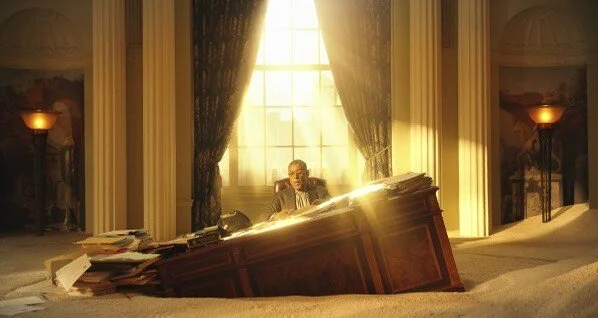Megalopolis Review
Francis Ford Coppola might be one of today's most well-known and respected directors. From The Godfather (1972) to Apocalypse Now (1979), Bram Stoker's Dracula (1992) to The Conversation (1974), his impressive filmography remains a must-see for many, even thus late in his career. Megalopolis, which is expected to be his final picture, is as close to a passion project as it gets; it has been self-financed and workshopped since the late 1970s, and Coppola has had his heart set on making it his whole career.
The story, being called a Roman epic, follows genius artist Cesar Catilina (Adam Driver), who seeks to propel the City of New Rome into a utopian, idealistic future, while his opponent, Mayor Franklyn Cicero (Giancarlo Esposito), remains committed to a regressive status quo that perpetuates greed, special interests, and partisan warfare. Julia Cicero, the Mayor's daughter and a socialite, is torn between them because of her feelings for Cesar. Megalopolis, a flurry of mad ideas, remarkable ingenuity, and difficult topics, is guaranteed to alienate people because it tackles too much, despite many of its aspects being worthwhile.
Despite the audience's reservations about this picture, one thing is certain: the performers will keep them in their seats. Megalopolis is directed by Adam Driver, who plays Catilina, and as always, he thoroughly immerses himself to produce exactly what the character demands. His oeuvre has a few unexpected turns, most recently White Noise (2022) and Annette (2021), and his performance in Megalopolis follows suit, allowing him to explore his eccentric side. He is great, crafting a persona with equal parts brains and snark. It's difficult to envision anyone else in the job.
Apart from Driver, the ensemble includes Jon Voight, Nathalie Immanuel, Aubrey Plaza, Giancarlo Esposito, Shia LaBeouf, Jason Schwartzman, and others. They're all wonderful in their own way, but Plaza and LaBeouf's eccentric roles are particularly appealing. The skill on exhibit is captivating, yet something is preventing it from working: the connection. Every performer and character feels like they've been taken from a separate film set, implying a genuine lack of chemistry that ultimately impedes enjoyment. Half of the actors, including Driver, Plaza, LaBeouf, and Voigt, play predominantly comedic roles, while the other half, particularly Esposito, play fully straight.
This issue appears to be due to the screenplay and direction, rather than the performers; there is a clear mismatch. Furthermore, with such a large cast, underutilization is clear.
In terms of storytelling, Megalopolis has a lot to offer. On the one hand, it's a very simple film to follow, transporting you into a world of corruption, political ambition, and love. Despite the lengthy runtime and complex-sounding storyline, the tale is simpler to follow than many would imagine, and if you can get past its absurd style, there's a terrific narrative with a worthy message. The parallel of the Roman Empire to modern civilization is undoubtedly fascinating, and it effectively merges historical components with a futuristic perspective. It requires you to look at the larger picture and undoubtedly has something to say about society.
On the other hand, the script overflows with ideas and a drive to be strange and frightening for the sake of it. Other issues are at play here that are underexplored, most notably Catilina's strained connection with his mother, Coppola's self-reflection, and the concept of time (or lack thereof). We learn early in the film that Catilina has the capacity to pause time, yet whenever this occurs, the tone is so out of sync with the rest of the film that it feels jarring. There are decisions in every aspect of filmmaking that appear to be there just to shock, from the awkward editing to the way the actors walk around the screen - even the names of the characters.
The writing alternates between humor and sci-fi drama with such frequency that it appears muddled and forced, detracting from some of the meaning. The humor works, as do the deeper issues and concepts; it simply doesn't come together.
The technological factors are as uneven as the other parts. There is so much stunning cinematography on exhibit, particularly in the various rooftop shots when our protagonists see the city. The usage of clock faces is visually appealing, and the color grading has a golden sheen that lends each picture a rich mood appropriate for the Roman environment. The golds feel quite royal, making a striking contrast against the technological setting. However, there are several scenes in which the screen feels overloaded with ideas. There are some unsteady visual effects that detract from the immersive aspect of the world-building, sometimes giving it a cheap vibe.
The lighter, more personal visuals are stunning, yet the wider ones feel crowded and too computerized. The original soundtrack nicely complements the film's tone, both in terms of plot and photography. The editing includes both high and low points, and it is clearly better when fewer attempts are made.
Since Megalopolis' Cannes debut, word of mouth has been overwhelmingly unfavorable. Even before its broad release, this intricate voyage was dubbed 'Megaflopolis', and moviegoers were tempering their expectations. Simply put, Megalopolis isn't a home run since the narrative, acting, and concepts are all confused. However, there is undoubtedly some fantastic filmmaking on exhibit, making it worth watching, particularly the cinematography and the overall unusual, imaginative nature.






